
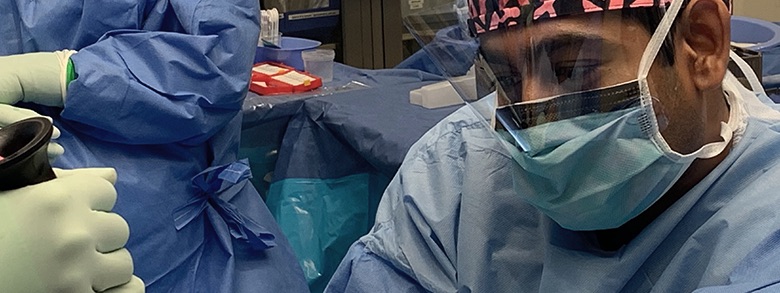
Most patients diagnosed with breast cancer will have surgery as part of their treatment plan. AHN Cancer Institute has a team of specialists who are highly experienced in a variety of breast cancer surgeries.
Our breast cancer surgeons often use hidden scar techniques and precise localization methods to remove cancerous and noncancerous tumors while trying to preserve the natural look of your breast. If needed, we also have plastic surgeons who perform reconstructive procedures to restore your breast to near-normal shape after a mastectomy or larger volume lumpectomy.
We’re here to help you every step of your journey, from diagnosis to treatment and rehabilitation. At the Breast Cancer Center of Excellence, our team of breast cancer specialists will work with you to tailor a comprehensive treatment plan that meets your specific needs.
Our breast cancer doctors may use a single treatment or a combination of breast cancer therapies to give you the best results possible. Most patients will have surgery to remove their breast cancer. You may also have other treatments, like chemotherapy and radiation.
The breast cancer surgeons at the AHN Surgery Institute aim to minimize the impact of breast cancer surgery by preserving the appearance of your breasts, restoring sensation, and reducing the number of surgeries needed.
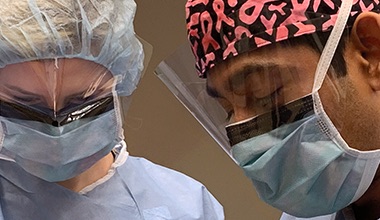
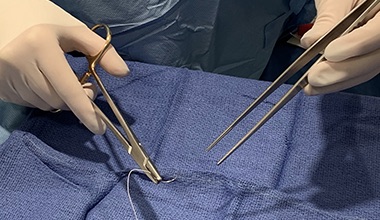


Our experienced breast cancer surgery team is here to help throughout your care journey. In addition to your physician team, you'll also be assigned to a dedicated navigation team. Our navigation team and support services provide you with highly trained nurses, financial advocates, and other supportive professionals to help plan your care.
We have a cancer nurse line dedicated to you and your loved ones. It’s free to anyone, at any time, 24/7. Call (412) 578-HOPE (412) 578-4673 and a cancer nurse will answer your questions, schedule an appointment, and provide support throughout your cancer treatment journey. If you're in Erie, call (814) 452-HOPE (814) 452-4673.
If you want a second opinion on your breast cancer diagnosis, our team of breast cancer specialists will review your medical records and offer recommendations. A second opinion involves a review of your outside breast imaging and breast pathology, including your prior breast biopsies or surgery records. We also review the breast cancer surgical opinion offered by your first surgeon. Your AHN breast cancer surgeon will recommend treatment options after reviewing your records.
You can then choose to have your care provided by the AHN breast cancer surgeon or return to your first surgeon. You can also receive care from other AHN specialists, including medical oncologists, radiation oncologists, and plastic surgeons.
Listen to the I Had Cancer podcast* to hear how a mother's battle with cancer inspired her daughter to care for others.
By accessing this podcast, I understand that I am leaving the AHN website and I will be re-directed to an external website operated by a third party platform provider. I acknowledge that the platform provider may collect personal information about me, and about the podcast that I view, on their platform and may use and disclose this information in accordance with its privacy policy. I agree that Allegheny Health Network is not responsible for the data collection and use practices of this third party.
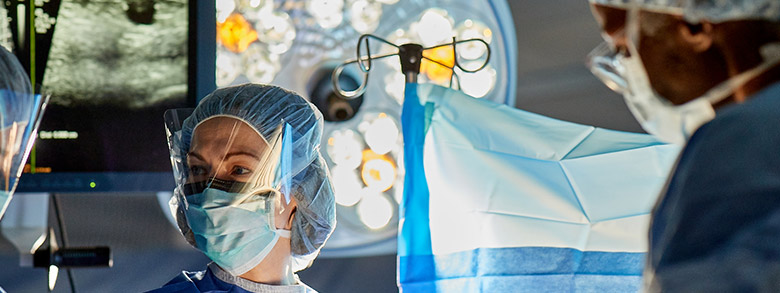
We work with you to tailor your comprehensive treatment plan. Breast cancer surgery is usually recommended to remove the cancer in your breast. Lymph nodes may also be evaluated to see if your cancer has spread. Our breast cancer surgeons may collaborate with a plastic surgeon to help preserve the appearance of your breasts.
These breast cancer surgeries are used to remove the lymph nodes found in your armpit.
Our plastic surgeons are skilled at different breast reconstruction surgeries performed during or following breast cancer surgery.
At AHN, all of our breast cancer surgeons are board-certified in general surgery, and many have also received the highest level of training in specialty areas, including breast surgical oncology (breast cancer surgery). Their focused training ensures you are in skilled, trusted hands.
Dr. Coopey is a breast surgeon with expertise in nipple-sparing mastectomies, the treatment of high-risk breast lesions, lumpectomy margins, and the use of Enhanced Recovery After Surgery (ERAS) protocols, which aim to decrease or eliminate opioid use, pain, nausea, and time spent in the hospital. Dr. Coopey has played a prominent role in multiple influential breast clinical research projects, is the director of the AHN Cancer Institute Wexford Breast Program, and the co-strategy and growth officer for the AHN Breast Cancer Program.
Jennifer D. Saldanha, MD, FACS, is a breast surgeon with the AHN Surgery Institute, specializing in surgical management of benign and malignant breast disease. She has expertise in performing nipple-sparing mastectomies and oncoplastic procedures.
If you need to make an appointment for breast cancer surgery, we're here to help.
Call (412) 578-HOPE (412) 578-4673 to schedule an appointment at the Allegheny Health Network Cancer Institute, or request a call.
If you require other treatments in addition to surgery at the Cancer Institute, such as chemotherapy and/or radiation, you can receive all of your care at AHN. Or you can choose to receive the additional treatments at another facility closer to your home. Your navigation team can assist to make the process seamless.
Schedule your annual mammogram today. Book my mammogram.
Find out with our breast cancer risk assessment tool.

The care journey for each patient can look different, but a nurse navigator will help you every step of the way. From coordinating appointments, to helping you manage side effects, to working on nutritional and financial issues, they’ll guide you and your family through the process.
AHN specialists lead the NSABP Foundation, the world’s preeminent breast cancer research program. It’s one of the largest focusing on breast cancer clinical trials.
Clinical trials are studies that try to answer questions about new ways to treat cancer with medications, radiation, or surgical techniques. Previous trials have shown how new methods of treatment improve survival and quality of life and reduce the risk of cancer returning.
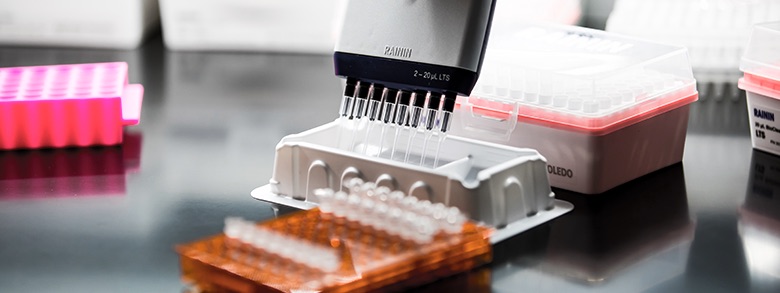
You need to meet certain criteria to participate in a clinical trial, and you only take part in it if you want to. Also, you can stop participating in a trial at any time.
The plan for the trial, called a protocol, explains the goal of the trial and how the study will be conducted. Based on the questions the research is trying to answer, each clinical trial protocol specifies the type of patient who can join the trial.
Common criteria for entering a trial are:
Federal rules help ensure that clinical trials are run in an ethical manner, with your rights and safety protected. These rules ensure that you’re not put at increased risk by participating in the trial, and that the results of the study are accurate and meaningful.
If you would like to participate in a clinical trial and help our innovative team discover groundbreaking cancer solutions, ask your doctor if you are eligible. See which clinical trials are currently active and open for participation.
There are three ways for medical professionals, who are not a part of Allegheny Health Network, to refer their patients to an AHN Cancer Institute specialist and request their first appointment. You can:
For more information about referring your patient to an AHN specialist, read the Independent Physician Referral FAQs.

After referring your patient to an AHN specialist, use the EpicCare Link platform to collaborate with their AHN specialist, view your patient's test results, treatment plan, and progress.
Log in to your EpicCare Link account now.
If you are new to EpicCare Link, or need to request your own EpicCare Link account, read: EpicCare Link for Patient Follow-up, for user instructions and new account request forms.
If you can’t access your patient's AHN test results through the EpicCare Link platform, your patient will need to complete and submit the correct AHN Medical Records Release form, based on their state of residency. Support your patient’s request by downloading the correct medical records release form for them:
EpicCare® is a registered trademark of Epic Systems Corporation and used with permission.
EpicCare® Link™ is a trademark of Epic Systems Corporation and used with permission.